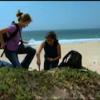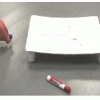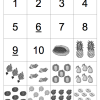Search Results
Showing results 81 to 100 of 178

Pop! Rocket Launcher
Source Institutions
In this activity, learners construct a simple air pressure launcher for paper rockets.

Differing Densities: Fresh and Salt Water
Source Institutions
In this activity, learners visualize the differences in water density and relate this to the potential consequences of increased glacial melting.

Stabilization Wedges Game
Source Institutions
This game introduces learners to the scale of the greenhouse gas problem, plus technologies that already exist to dramatically reduce our carbon emissions and prevent climate change.

The Orange Game: Routing and Deadlock in Networks
Source Institutions
When a lot of people share one network (such as cars using roads, or messages getting through the Internet), there is the possibility that competing processes will create a “deadlock," or an interrupt

Recycling Paper
Source Institutions
In this crafty chemistry activity (on page 2 of the PDF), learners make their own paper from used paper they may have otherwise thrown away.

Magic Lanterns
Source Institutions
A magic lantern is a light that projects an image onto a screen.
MarsBound!: Mission to the Red Planet
Source Institutions
MarsBound! is an engineering simulation activity in which learners use realistic techniques to plan a mission to Mars.

Pop Can "Hero Engine"
Source Institutions
In this activity, learners build water-propelled engines from soft drink cans.

Dinosaur Flesh and Bones
Source Institutions
In this activity, learners explore dinosaur skeletons.

Screaming String Thing
Source Institutions
In this simple and fun activity, learners discover the relationship between vibration and sound by making a squeaky toy instrument out of simple household materials.

Beat the Clock: Sorting Networks
Source Institutions
Even fast computers are limited to how quickly they can solve problems. One way to speed things up is to use several computers at once.

Sand Dunes
Source Institutions
This outdoor activity (on page 2 of the PDF under SciGirls Activity: Sand Dunes) is a full inquiry investigation into how the amount of moisture in a sand dune relates to the number of plants growing

Seeing the World Through a Different Lens
Source Institutions
Learners participate in a variety of activities modeling different disabilities.

Oil Spill Solutions
Source Institutions
In this activity, learners explore how environmental engineers might approach solving the problem of an oil spill.

Rutherford Roller
Source Institutions
In this activity, learners make a black box device that serves as an excellent analogy to Rutherford's famous experiment in which he deduced the existence of the atomic nucleus.

Memory Match
Source Institutions
In this classic memory game (on pages 37-45 of PDF), learners turn over tiles to reveal images on the back.

Sustainable Fishing
Source Institutions
In this activity, learners use a model for how fishing affects marine life populations, and will construct explanations for one of the reasons why fish populations are declining.

Robot Basketball
Source Institutions
In this activity, learners explore accuracy and precision.

Nano Latch-n-Catch
Source Institutions
In this activity, learners design a therapeutic agent to image and/or cure various diseases in the respiratory system.

The Carbon Cycle and its Role in Climate Change: Activity 2
Source Institutions
In this activity (on page 7), learners explore the meaning of a "carbon sink." Using simple props, learners and/or an educator demonstrate how plants act as carbon sinks and how greenhouse gases cause
